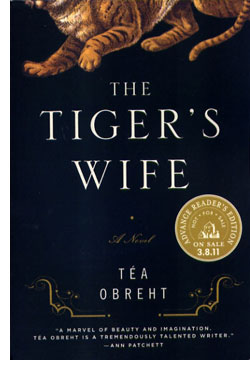 |
 Téa Obreht
Téa Obreht
The Tiger's Wife
Random House
US Hardcover First Edition
ISBN 978-0-385-34383-1
Publication Date: 03-08-2011
352 Pages; $25
Date Reviewed: 01-14-2012
Reviewed by: Rick Kleffel © 2012
Index:
General Fiction
Fantasy
Horror
Language circumscribes our vision of the world, of our lives and ultimately of ourselves. The prose voice that tells our story is comprised of words and grammar, syntax and style. Reading, then, allows us to immerse ourselves in another's life and vision as we immerse ourselves in their words. As readers, we need not realize that the author's vision has informed the words we read. Indeed, the author him or her self may not realize this. The words they choose, that we read may flow from the tip of their pen or be wrestled from blocks of prose, but those choices become our vision of the world as we read.
The best prose stays with us, the most powerful grammar infects our speech and ultimately, they tweak our vision of the world. Téa Obreht's vision of the world as a complex spiritual landscape, full of promise and premonition, intimation and terror informs and powers the stories that become ours in 'The Tiger's Wife.' It's a novel that builds with each word a new world for the reader.
Obreht's novel opens as it immerses us in Natalia's earliest memory of her grandfather; a visit to a zoo embedded in an ancient fortress, where they witness true wonder clothed in terror. It's a memorable scene, and an omen of what is to follow in the novel. The ominous, or numinous, depending on your perspective, aspect of the scene is the reader's gateway into a story informed by stories and visions. Often they are one in the same as this incredibly talented writer moves effortlessly from reportage to folklore, easily erasing the boundary that supposedly separates the two.
We soon learn that Natalia's grandfather has died in circumstances that are muddied by the remnants of a war that has literally torn the unnamed Balkan country in which it is set into fragmented countrysides and cityscapes. Those remaining scratch the surfaces around them, trying to wrest a living from what seems to be dirt, rock, concrete and weeds. Natalia, who has followed in her grandfather's footsteps and become a doctor, and her friend Zôra, are on a mission to deliver medicine to children. Natalia is also on a mission to understand her grandfather's life and his death.
Obreht tells much of the story anecdotally, as Natalia recalls the stories her grandfather told her, particularly those of the "Deathless man," he met in his travels round the country as a doctor. The myths join the forensic evidence she finds and the difference becomes moot in the brutish world she encounters. Her grandfather is from the get-go a towering, intense, but never overdone presence, balanced by Natalia's brittle strength. These characters compel the reader to join them on a journey through a landscape both mythic and madly modern.
Matching the power of the characters and the stories, fables, tales and anecdotes that layer into the arc of this fine novel is the prose itself. It's the core of a visionary journey that does not seem visionary, but gritty and real. Obreht's grammar is truncated and rough. Her word choices are odd and memorable. Reading the book is like driving downhill on a dirt road covered with rocks and potholes. We're pulled relentlessly forward, but we feel every bump, every contour, every grain of dirt and every crumbling slope falling away beneath us.
'The Tiger's Wife' is one of those novels that are replete with elements of the fantastic that never seem fantastic. Totemic animals rend flesh or clump quietly down empty streets. A family seeks the bones of a lost loved one to stop the curse that is striking those who remain down with sickness. A man who merely cannot die but arrives during an epidemic of tuberculosis is mistaken for a vampire. The visions of the characters are more real to the reader than our own understanding of the world. To us, vampires and the undead are the stuff of genre fiction good and bad; in this world, they are as real as a bucket of oleander soup, and just about as dangerous. Given the publisher and the prestige deservingly accorded to this novel, you're going to find it with literature, but it could be just as happily shelved next to the work of Jeff VanderMeer and China Miéville as it is with that of Gabriel Garcia Marquez.
'The Tiger's Wife' is well worth looking for. You may be glad you won't have to look too hard, but as you read this gorgeously written novel, you'll understand your world anew. You'll see that the steps you take on the driveway and the drive to the grocery store have their own omens and their own myths. Obreht's language will infect yours. You will find that as you employ her rough grammar to wrestle the world into shape, your journeys now have a wild, terrible and strange beauty.
|
 |




